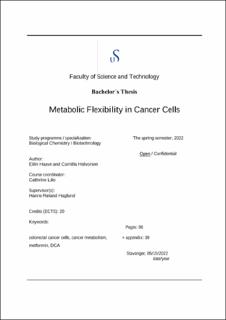| dc.contributor.advisor | Røland Hagland, Hanne | |
| dc.contributor.author | Haave, Eilin | |
| dc.contributor.author | Halvorsen, Camilla | |
| dc.date.accessioned | 2022-09-15T15:51:52Z | |
| dc.date.available | 2022-09-15T15:51:52Z | |
| dc.date.issued | 2022 | |
| dc.identifier | no.uis:inspera:108213961:49467455 | |
| dc.identifier.uri | https://hdl.handle.net/11250/3018190 | |
| dc.description.abstract | Kolorektalkreft er den tredje mest forekommende krefttypen blant både menn og kvinner i USA. Selv om kreftbehandlinger har blitt revolusjonerende forbedret gjennom flere tiår, er det stor etterspørsel etter mer effektive behandlinger, noe som gjør forskning innenfor det komplekse aspektet av kreft avgjørende for utformingen av svært spesifikke og effektive terapier. Manipulering av kreftmetabolisme har vært et interessant forskningstema og har vist seg å være et lovende felt for fremtidige terapeutiske metoder som en del av kreftterapi.
Metformin (bimetylbiguanid) tilhører en klasse legemidler som heter biguanider og brukes i dag som medisin for å behandle type II diabetes. Dikloracetat (DCA) brukes i dag til å behandle diabetes mellitus, lipid- og lipoproteinforstyrrelser, pulmonal arteriell hypertensjon og ervervet og medfødt laktacidose. Begge legemidlene har vist interessante effekter på metabolismen av kreft.
Målet med denne studien var å undersøke effekten av metformin og DCA på kolorektale kreftcellelinjer HCT116 og SW948 ved bruk av alamarBlue- og CCK-8-analyser samt flowcytometri.
Resultatene indikerer at metformin har en avtagende effekt på levedyktigheten i begge cellelinjene, hvor den mest effektive behandlingen var en 6 mM konsentrasjon etter en eksponeringsperiode på 48 timer. DCA viste en motsatt effekt i forhold til metformin, der den høyeste konsentrasjonen (6 mM) og lengste eksponeringsperiode (48 timer) ga høyest levedyktighet. Disse resultatene indikerer at våre spesifikke cellelinjer er mer avhengige av mitokondriell metabolisme i stedet for det glykolytiske.
Flowcytometrien for denne studien målte uttrykket av Akt, p-Akt, AMPK og p-AMPK. Begge cellelinjene viste en økning i ekspresjonen av p-Akt og AMPK etter behandlingen med metformin. SW948 hadde også et mindre skift i Akt-uttrykket. DCA hadde ingen innvirkning på ingen av proteinuttrykkene. | |
| dc.description.abstract | Colorectal cancer is the third most occurring cancer type among both men and women in the United States. Even though cancer therapies have been revolutionarily improved over the decades, there is a high demand for more effective treatments, making research within the complex aspect of cancer crucial for the design of highly specific and effective therapies. Manipulation of cancer metabolism has been an interesting topic of research and has shown to be a promising field for future therapeutic methods as a part of cancer therapy.
Metformin (bimethylbiguanide) belongs in a class of drugs named biguanides and is today used as a medication to treat type-II diabetes. Dichloroacetate (DCA) is currently used to treat diabetes mellitus, lipid and lipoprotein disorders, pulmonary arterial hypertension, and acquired and congenital lactic acidosis. Both drugs have shown interesting effects on the metabolism of cancer.
The aim of this study was to examine the effects of metformin and DCA on colorectal cancer cell lines HCT116 and SW948 with the use of alamarBlue- and CCK-8 assays as well as flow cytometry.
The results indicate that metformin has a decreasing effect on the viability in both cell lines, where the most effective treatment was a 6 mM concentration after an exposure period of 48 hours. DCA showed an opposing effect in respect to metformin, where the highest concentration (6 mM) and longest exposure period (48 hours) generated the highest viability. These results indicates that our specific cell lines are more reliant on the mitochondrial metabolism rather than the glycolytic.
The flow cytometry for this study measured the expression of Akt, p-Akt, AMPK, and p-AMPK. Both cell lines showed an increase in the expression of p-Akt and AMPK after the treatment with metformin. SW948 also had a minor shift in the Akt expression. DCA had no impact on neither of the protein expressions. | |
| dc.language | eng | |
| dc.publisher | uis | |
| dc.title | Metabolsk Fleksibilitet i Kreftceller | |
| dc.type | Bachelor thesis | |
